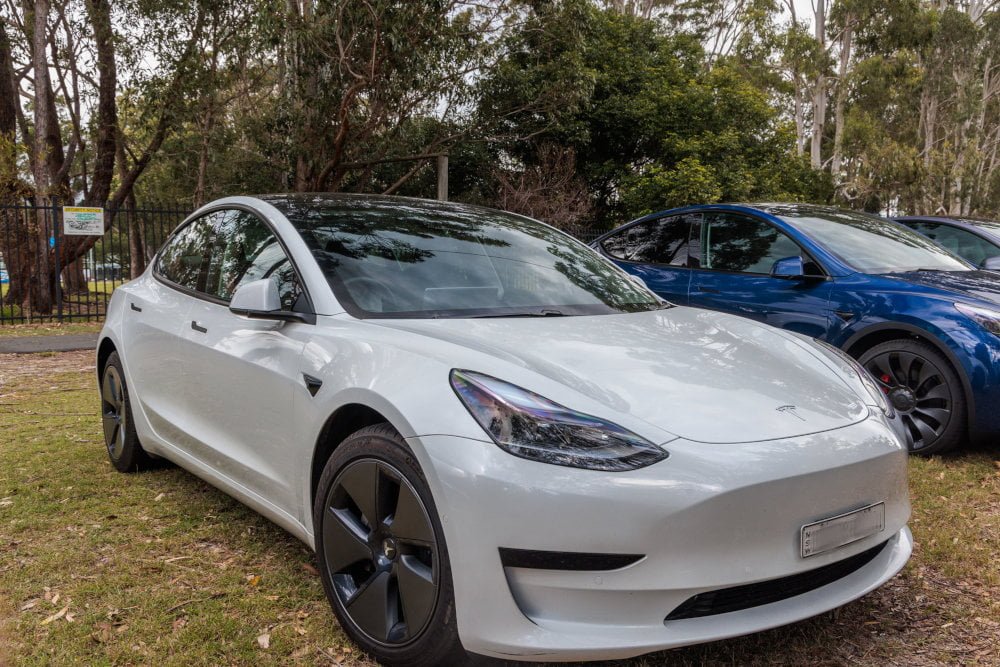Electric momentum

What was Australia’s top selling new passenger car in January 2023?
And what was it in February?
Tesla 3.
Both months.
An electric car!
Hard to believe?
Well, it’s true, but that’s a bit misleading.
While utes aren’t cars, they’re passenger vehicles, and in this country diesel and petrol utes consistently outsell everything – hands down.
In January, Australians bought 4749 Ford Rangers and 4131 Toyota HiLuxes.
There were 2927 Tesla model 3s delivered in the same four weeks.
So, lumping car and utes together, the Tesla was actually third best passenger vehicle sold.
Still, that’s stunning.
It was the first podium finish for any electric vehicle in Australia.
Rangers, HiLuxes and model 3s held their places in February, with 2671 model 3s sold.
In March Tesla’s electric model Y was fifth overall behind three utes and a four-wheel-drive.
In April model Y moved up to fourth behind two utes and a “sport utility vehicle” while the next best electric was model 3 in tenth spot.
There are now more than 30 electric car makes available here, including BYD, Nissan, MG, Polestar, Hyundai and Kia.
Sales are surging.
Momentum’s mounting.
A global transition to deal with climate chaos is obvious.
And more change is on the horizon.
Despite this, substantial mainstream electric vehicle anxiety remains around high purchase prices, kilometre range, lithium, cobalt, manganese, nickel and graphite mining for batteries, limited and broken charging stations, towing capacity, battery replacement costs, feeble government financial incentives and no fuel efficiency standards yet.
Yes, these issues are being handled, to varying degrees.
Electric vehicles seem certainly headed toward dominating worldwide transport.
Potentially powered by renewable energy, cutting tailpipe emissions, running costs and noise pollution are key advantages.
Nevertheless, several concerns still bug me.
For starters, we can’t buy ourselves out of our climate mess.
New electric vehicles are part of a solution, but they’re merely one piece of a complex puzzle.
Every aspect of our lives requires attention.
Fossil-fuelled energy, transport and industry plus livestock agriculture are our worst climate crisis accelerators.
Plant-based agriculture, replacing dinosaur technology with renewables, cleaning-up and enhancing our air, water and land, curbing resource use and waste, improving social equality (that extends to developing nations), restoring biodiversity, reigniting circular recycling along with coordinated political, social and economic stability all must be addressed.
Australia’s overall greenhouse pollution continues to rise and transport emissions are the fastest.
In 2022 alone, Australians bought 1.08million new vehicles.
There are more than 20million vehicles on Australian roads, of which, about 16million are petrol and diesel passenger vehicles.
Despite phenomenal sales, there’s only about 100,000 electric cars registered in Australia.
Think about that.
Cars are simply one step in the right direction.
Australian cars stay in use for an average of 10 years so even if the present electric drift maintains pace, complete replacement of petrol and diesel cars remains years away.
Offsets such as reforestation, waste reduction and creating circular materials use of plastics, natural fibres, minerals and metals are a must.
Currently, most electric car batteries are recharged with coal-fired electricity and our politicians still persist in backing dirty business-as-usual expansion of greenhouse-polluting coal, gas and oil projects before renewables.
This has to end.
Rechargeable batteries contain loads of lithium and other scarce materials which are not renewable and have been mined in ways that alarm environmentalists and human rights advocates.
This has to be overcome.
Shortcomings are being dealt with.
On the battery front, for instance, breakthroughs are regular news.
Scientists, engineers and manufacturing workers last month announced they had found a way to replace lithium with sodium, basically salt which is found all over the world, costs about two per cent of lithium and is chemically very similar.
Yes, Australia is small fry.
Change though is inevitable.
Massive worldwide take up of electric cars has already displaced 1.5billion barrels of oil which had been used every day.
Change is not a strong enough word.
Revolution is what we could be part of.
My thoughts come down to this: early electric car adopters deserve commendation, as do those who simply plant trees and push for common good in numerous other ways, such as working for social equity and the need for fuel efficiency standards without loopholes anyone could drive a truck through.
We will succeed if we do what we can on the home front, support new technologies where we’re able and maintain pressure on politicians, industry, finance and social leaders to back genuine, practical social and ecological action.
